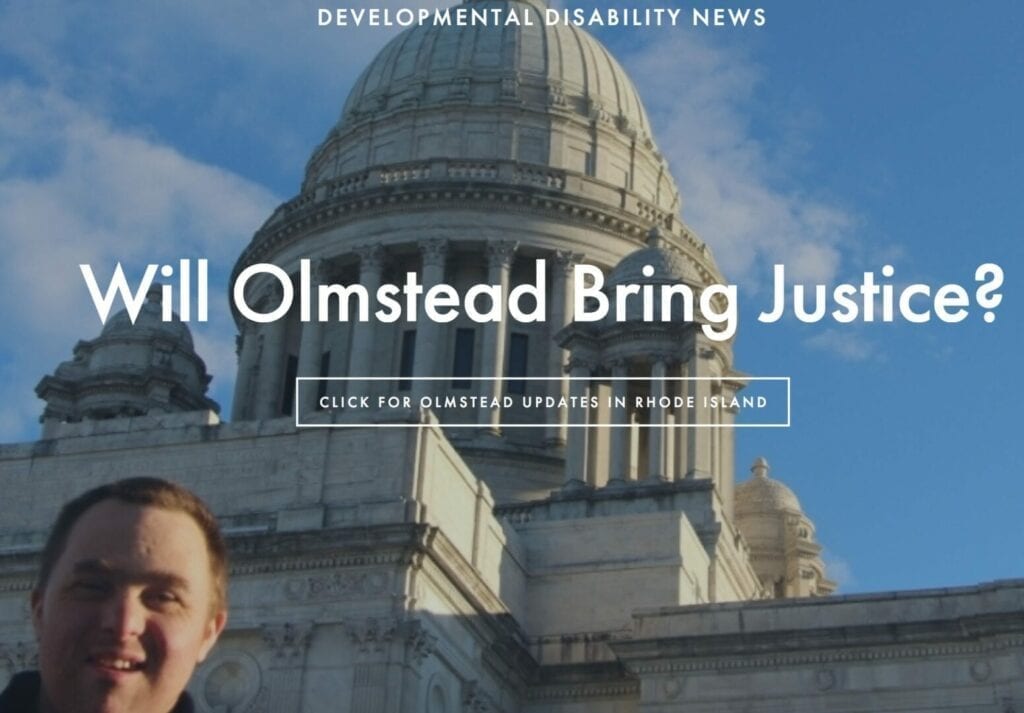Search Posts
Recent Posts
- GriefSpeak: Waiting for Dad – Mari Nardolillo Dias June 13, 2025
- Rhode Island Weather for June 13, 2025 – Jack Donnelly June 13, 2025
- Urgent call by Rhode Island Blood Center for Type O- and B- blood June 13, 2025
- Real Estate in RI: Ready, Set, Own. Pathway to Homeownership workshop June 13, 2025
- Outdoors in RI – Risky cattails, Fight the Bite mosquito report, 2A gun ban bill update June 13, 2025
Categories
Subscribe!
Thanks for subscribing! Please check your email for further instructions.

Developmental Disability News: New US probe brings urgency to RI funding debate – Gina Macris
By Gina Macris, publisher, Developmental Disabilities News
(Article was being developed as the US Attorney, Cunha, called his press conference to announce the civil rights violation of children with behavioral health disabilities)
Private agencies providing health and human services to vulnerable Rhode Islanders stand to get far less money than recommended by the state Office of the Health Insurance Commission (OHIC) if Governor Dan McKee’s budget is approved by the General Assembly.
The funding of some of these agencies – or lack of it – is connected to alleged civil rights violations announced May 13 by the U.S. Attorney. Zachary A. Cunha in connection with 527 children with behavioral issues in state care who have been “warehoused” at Bradley Hospital, in large part due to a lack of appropriate home and community-based services.
Over a five-year period, 40 percent of the children bounced in and out of Bradley for months and even years, with their conditions often becoming worse, not better, in the process.
One child with developmental disabilities who does not speak spent more than a year in Bradley and still becomes visibly upset any time the hospital comes into view through the windows of the family car, according to findings released May 13 by the U.S. Attorney’s Office and the Office of Civil Rights for the federal Department of Health and Human Services.
The over-hospitalization of children with behavioral issues has been much-discussed in the child welfare community for years and has led advocates, including the RI Developmental Disabilities Council, to press for a federally-recognized “Olmstead” plan to address continuing violations of the civil rights of children and adults with disabilities. “This must be addressed immediately,” the Council’s executive director, Keven Nerney, said in a statement.
The dearth of integrated, community-based services also led to a law enacted by the General Assembly in 2022 requiring a comprehensive review of federal-state Medicaid rates paid to private providers of a variety of social and human services every two years.
In addition to behavioral healthcare and children’s services, the agencies affected by the OHIC rate review include those for adults with developmental disabilities and other Medicaid home and community -based services. Many of them have struggled to keep their doors open because reimbursement rates that in some cases, have remained unchanged for a decade or more.
GOVERNOR WOULD SLOW PACE OF RATE HIKES
With the first OHIC-recommended pay hikes due in July, the governor has proposed rolling out only one-third of the increases immediately. The remaining rate hikes would be spread out over the next two fiscal years, in July, 2025 and July, 2026, according to the budget he submitted to the General Assembly in January.
Going forward, McKee would alter the review schedule from the General Assembly’s two years to four years.
Spokespersons for the private agencies say that McKee’s proposals would be a setback for rate hikes recommended by OHIC.
McKee’s spending plan for Fiscal 2025, beginning July 1, calls for $56 million in federal-state Medicaid funding in the fiscal year beginning July 1, including $22.2 million in state dollars.
Asked prior to the DOJ findings why Governor McKee did not recommend full implementation of the OHIC recommendations in the coming budget, a spokeswoman said that the full cost would have required $90 million in state revenue in a single year.
The proposed budget includes $20.4 million for one-third of the recommended rate increases; except for early intervention, which would be fully funded with $1.7 million.
In a statement, the governor’s spokeswoman put the OHIC-recommended rate increases in the broader context of other needed investments, including more than $50 million for health and human services providers outside the scope of the OHIC rate review, and $29.1 million to establish rates for Certified Community Behavioral Health Clinics (CCBHC)– a new approach to delivering coordinated behavioral health services. CCBHCs receive enhanced federal Medicaid funding to deliver comprehensive mental health and substance use services to anyone, regardless of age, insurance, or diagnosis.
“This proposal represents an effort to correct more than a decade of underinvestment in provider rates without forcing cuts to other important government programs or tax increases,“ the spokeswoman said, despite the loss of pandemic-era federal funds and the return to projected deficits in the state budget.
IMPLEMENTATION PLAN HEARD BY SENATE FINANCE
The issues were aired at a Senate Finance Committee hearing May 2, at which Cory King, the state health insurance commissioner said he would roll out the governor’s four-year review plan by dividing the agencies into four service categories, looking at one of them every year.
King said he would add primary care to the mix because of a dearth of available physicians. His office also would have discretion going forward to add or remove services from the rate review cycle.
A four-year cycle would allow his office to do a “deep dive” into the needs of each of the four categories, King said. The proposed annual schedule, beginning with the start of Fiscal Year 2025 on July 1, is:
• Primary care and home and community-based services
• intellectual and developmental disabilities
• behavioral healthcare
• children’s services
Sen. Jonathon Acosta, D-Central Falls and Pawtucket, asked King to address concerns that the Health Insurance Commissioner’s discretion might be used to remove services that carry a big price tag.
State Sen. Louis DiPalma, Chairman of the Senate Finance Committee, said the four-year cycle could work if those agencies not under review receive an annual cost-of-living increase, but the governor’s proposed amendment does not include one.
DiPalma said in an interview, “We got to where we did because we didn’t make adjustments over time. We’re talking about people’s lives.”
“This costs money,” he said. “We have to figure out how to make this happen.”
Some agencies only stay open by subsidizing their services from other sources, he said.
Linda Hurley, president and CEO of CODAC Behavioral Healthcare, said the agency gets $88 a week from Medicaid for each staff salary.
Over the Massachusetts line in Seekonk, she said, a provider gets more than $200. “It’s incomprehensible,” she said.
Hurley asked the General Assembly to approve the entire 62.4 percent increase for behavioral healthcare recommended in a comprehensive OHIC study completed last fall.
“We are desensitized” to the communities and families impacted by opioid deaths, Hurley said.
Shamus Durac, staff attorney for the Rhode Island Parent Information Network, said that without a cost-of-living increase, the proposed four-year cycle of rate reviews will result in the same lags in reimbursement that human service agencies have seen for many years.
He opposed the inclusion of primary care in the human services rate review cycle, saying it is governed by a different payment methodology and different reimbursement law.
John Tassoni, president and CEO of the Substance Use Mental Health Leadership Council, said the state’s certified behavioral health care clinics cannot survive four years without a rate increase.
“A lot of agencies are on the cusp,” he said. If one or two agencies go under, it will increase the burden on hospital emergency rooms, where the wait already can run 12-14 hours.
The push for regularly-scheduled reviews of reimbursements for community social and human services grew out of the advocacy by DiPalma and others for private providers of services for adults with intellectual and developmental disabilities (IDD), which had not had a rate review since 2011.
That review brought cuts in salaries and services, with critics saying it virtually “invited” a federal investigation of civil rights violations. A spokesman for the General Assembly has rejected that characterization.
In 2014, the state reached agreement with the DOJ in a consent decree, promising to a correct an over-reliance on segregated care, which violated the Integration Mandate of the Americans With Disabilities Act. A decade later, that case continues. Spokespersons for developmental disabilities organizations have said the governor’s proposed roll-out of the OHIC recommendations also would set back progress they have made through the 2014 consent decree.
DD OLMSTEAD CASE INTERSECTS WITH BRADLEY CASE
As in 2014, the most recent federal investigation concludes the state violated the Integration Mandate of the ADA, which was reinforced by the Supreme Court Olmstead decision of 1999.
Amy Romero, the Assistant U.S. Attorney leading the Bradley case, also has been involved for several years in the developmental disabilities case, which affects some 4,000 people receiving services from the state Department of Behavioral Healthcare, Developmental Disabilities and Hospitals.
The state has ten days to respond to Romero about its intention to work together with the DOJ to correct the civil rights violations or face litigation.
A spokeswoman for the governor indicated the state will cooperate. “Together, we will continue to seek short and long-term solutions to provide each child with a behavioral health disability the appropriate services in the most integrated setting,” the spokeswoman said.
The state’s Executive Office of Health and Human Services and DCYF are working to leverage federal funding to expand existing community-based behavioral service options for children, the investigation found.
But the findings also say those services are not available to most of the children who languish at Bradley, who, when discharged, may not go to an appropriate setting.
The report cited the case of a five-year-old who had post-traumatic stress from having been sexually abused. Once she had been stabilized at Bradley over one or two weeks, she was to go to therapeutic foster care without other children, but she languished in the hospital for months until she was discharged to a setting with significantly older children, against her doctors’ wishes.
“We found that DCYF is not actively monitoring the capacity or taking systemic steps to proactively address the insufficient capacity of its current network of community-based providers to fully meet the demand for various community-based services,” according to the findings.
Meanwhile, in 2020, DCYF eliminated enhanced reimbursements paid to therapeutic foster care families specially trained to care for children with psychiatric and behavioral needs.
The U.S. Attorney, Cunha, Melanie Fontes Ranier, director of the federal Health and Human Services (HHS) Office for Civil Rights (OCR) announced the results of the joint investigation at a press conference. The investigation, which began with a civil rights complaint to HHS in late 2021, covered a five-year period between 2017 and 2022.
___
Editor’s Note: Read “RI violates Civil Rights of Children with Behavioral Health Disabilities: an utter void in crisis services” – 5-14-24
___

Gina Macris is a career journalist with 43 years’ experience as a reporter for the Providence Journal in Providence, RI. She retired in 2012. During her time at the newspaper, she wrote two series about her first-born son, Michael M. Smith. Both series won prizes from the New England Associated Press News Executives Association. Michael, now in his 30s, appears on the cover page, in front of the Rhode Island State House. She is the founder and publisher of Developmental Disabilities News.


Thank you for your work in this very difficult line of work. Thanks to RI news today for publishing this article.